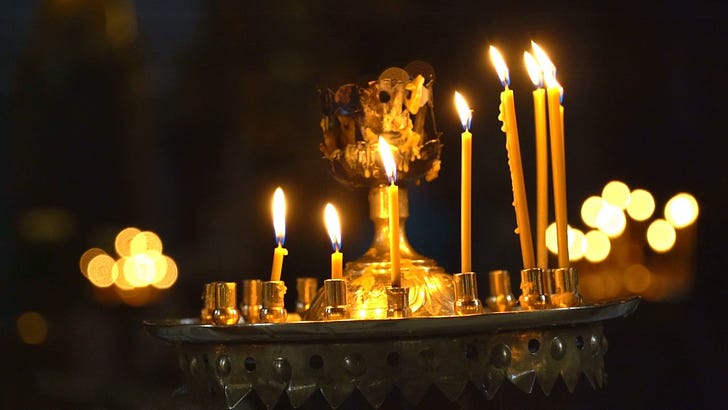Flashback 2.0 -- GetReligion encore at Dispatch Faith
Newsrooms have changed how they cover many faith issues and almost everything else
A confess: I am still figuring out the whole “what Substack is all about” thing.
Writing here is sort of like a column. It’s sort of like an evolving magazine. It’s sort of like a personal newsletter.
So, in this case, consider this a newsletter note from me that is linked to the rather-GetReligion-esque post that I did the other day with this headline: “Many journalists don't have no songs....”
You may recall that I mentioned that, after two decades, I closed the GetReligion website — which focused on the struggles of most mainstream newsrooms to do accurate, balanced, respectful coverage of many kinds of believers in the complex world of religious faith. I wrote a finale for that project and also wrote a rather sobering, I think, post about why I had decided that the website needed to close. The massive GetReligion archive — something like 16 million words or so — remains online for use by writers and researchers. Give the archive search engine a spin.
OK, that Rational Sheep post the other day also focused on the fact that a friend and colleague, Michael Reneau of The Dispatch, had just published an introductory post for a weekly feature called Dispatch Faith. That post include a reference to GetReligion.
Yes, this is getting complicated and sort of like a house of mirrors.
Anyway, in an almost Calvinist twist, I was on the road the second half of this past week — right into Reneau’s corner of East Tennessee. We talked about Dispatch Faith quite a bit and, to make a long story short, that led to a post summarizing, for Dispatch readers, parts of the closing chapter of GetReligion. Here’s the double-decker headline on that:
The Media’s New Religion
Major news outlets have changed how they cover faiths and the faithful. But we still need honest religion reporting.
Here is a byte from Reneau’s introduction:
As I wrote in the inaugural edition of this newsletter last week, one of the main goals of Dispatch Faith will be to examine how religion plays a role not just in individual lives, but in communities and societies. …
Terry Mattingly has spent decades seeking to do the same — and pointing out when the mainstream press has failed in that endeavor. A seasoned “Godbeat” pro himself, he’s written his weekly syndicated “OnReligion” column for more than 30 years. He’s also run college journalism programs, and for 20 years he led the GetReligion website. … Now, with his Rational Sheep Substack, Terry reports and reflects on how mass media culture influences religious believers and non-believers alike.
For Dispatch Faith this week, Terry harkens back to his recent work at GetReligion to analyze how big media got so bad at understanding faith.
By all means, read that whole GetReligion encore. But here is a key part of that:
Why did we close? I will admit that — having come up in the print journalism days — I have, in recent years, struggled to accept the many ways in which the digital age has changed the business model for the mainstream press. It has become more and more obvious to me that the old-school “liberal” values of the American model of the press have evolved into something else, a niche-based advocacy journalism that is increasingly “illiberal” when handling complex, divisive subjects (like religion).
I wrote about that last year in an essay for the journal Religion & Liberty. Then, many of the themes that dominated my piece appeared in the massive essay “When the New York Times lost its way,” written by journalist James Bennet for The Economist. That byline is especially symbolic since Bennet led the Gray Lady’s editorial pages during the 2020 newsroom meltdown ignited by the publication of Sen. Tom Cotton’s op-ed in which he backed the use of troops to stop violent riots (as opposed to legal protests) after the death of George Floyd.
Bennet thought his job was secure, since he was defending liberal values he learned during his New York Times career. But he was wrong, he said, because “I was the one ignorantly fighting a battle that was already lost. The old liberal embrace of inclusive debate that reflected the country’s breadth of views had given way to a new intolerance for the opinions of roughly half of American voters.”
The bottom line? He added this killer thesis: “The reality is that the Times is becoming the publication through which America’s progressive elite talks to itself about an America that does not really exist.”
Part of that warped worldview is the attitude that religious folks who insist on believing that some truths are eternal and absolute are, to use an old Texas phrase, a few tacos short of a combination platter.
Thus, here is the end of the Dispatch Faith post:
The bottom line for many journalists: Why do accurate, fair-minded, balanced coverage of crazy people?
Recently, I’ve begun using the following equation to express the niche-news era in which journalists, on the left and right, now live: “Good people can do nothing bad. Bad people can do nothing good.”
This is a lie, of course, and a dangerous one. For proof, see America, 2024.
That’s the end of this short bit of diary material. I promise that I will not made this kind of promotion work a regular part of the Rational Sheep mix (unless I get desperate).





Maybe a post like this is an okay spot for a question.
What media for children or the whole family doesn't make fun of fathers? On one hand we know it's baked in to the liberal worldview. Now that things are getting worse, what is worth keeping? I know you mentioned shelves of DVDs in another post. Could you do a best of media post sometime for those of us wanting to preserve something?